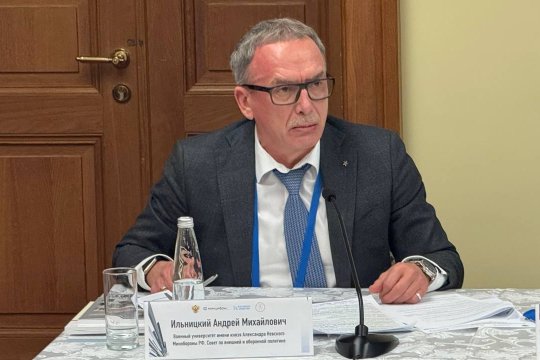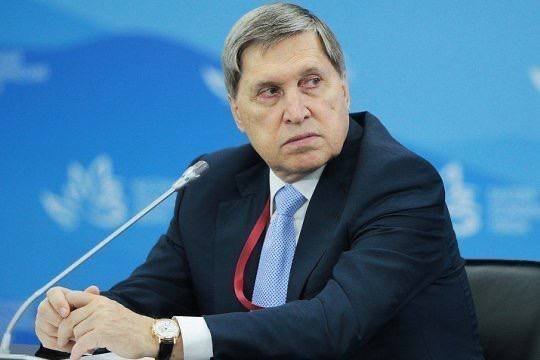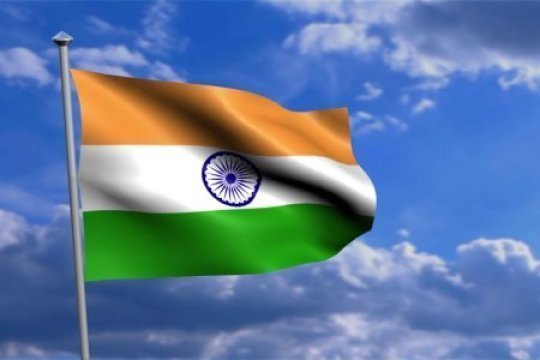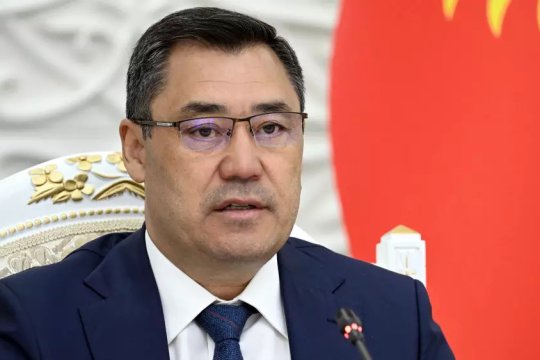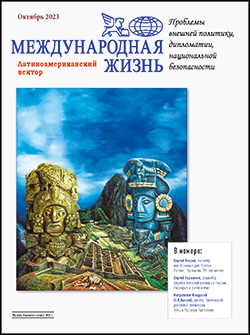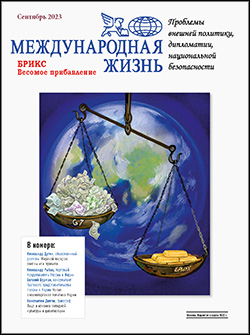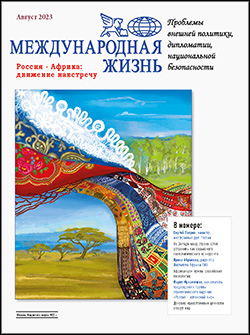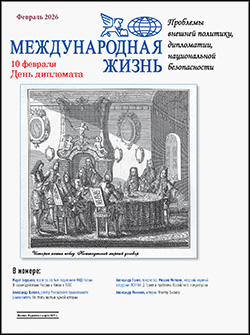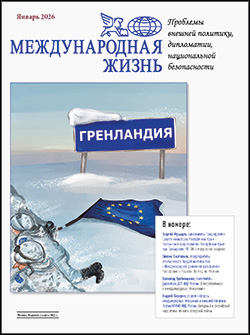Sergei Lavrov, Russian Foreign Minister’s Press Conference on the results of Russian diplomacy in 2012.
Keywords: press conference of the Minister of Foreign Affairs of Russia, summarizing the results of foreign policy in 2012, Sergei Lavrov.
POLITICS
I. Ivanov. Will the world be held hostage to nuclear weapons
The famous Manhattan Project to develop nuclear weapons was launched in the U.S. in September 1943. This date is considered to be the beginning of the nuclear age. When the developers of the Manhattan Project in the United States and I. Kurchatov’s group in the Soviet Union created the first atomic bombs, they were unlikely to have expected that their creations were destined to have such a long life.
Keywords: Manhattan Project, nuclear weapons, "Baruch Plan" START-3 missile.
V. Sergeev. Worthless lessons of history, or who Afghanistan surrendered to.
Barack Obama had announced the upcoming withdrawal of U.S. troops from Afghanistan even before being re-elected President of the United States. This should happen by the end of 2014. Probably the western school of political science can devise a politically correct term that will characterize the next defeat of Western powers on Afghan territory.
Keywords: Afghanistan, "Al-Qaeda", Britain and Afghanistan.
V. Gulevich. The importance of the Polish-Russian dialogue
Not with any other neighboring country has Russia formed such an uneasy relationship as that with Poland. But at the same time, attention should be paid to their diversity. The Polish-Russian neighborhood is not measured only in politics or economics. It is also in cultural and private human relationships.
Keywords: Poland, Russia, international relations.
A. Davidenko. Parliamentary diplomacy in action
The 21st session of the Asia-Pacific Parliamentary Forum (APPF) held in Vladivostok on Ruski island on 27th-31st of January 2013, became the most representative in the history of international parliamentary organizations, and led to the adoption of 14 resolutions in key issues of political, economic trade , and humanitarian cooperation for countries in the Asia-Pacific region.
Keywords: 21st session of the Asia-Pacific Parliamentary Forum (APPF), parliamentary diplomacy, the APR, the Russian Far East, Asia-Pacific dialogue - Europe, Russia's presidency in the APPF.
ARABIC VECTOR
S. Filatov. Kidnapping revolution
Two simple men spoke with one voice - Beshir Sassi, an unemployed Tunisian, and Abdelhamid Gohar, an Egyptian peasant, said, "We are pleased that we have accomplished the Revolution. We now have a lot of freedom and democracy. Nobody can be arrested just because we think differently to our new rulers. We do not live better, but we are freer, and this is the main thing. "
Key words: the second anniversary of the "Arab Spring", the Islamists against non Islamists, Tunisia and Egypt in the conflict period, the "Arab Spring" in facts and figures.
A. Lyukmanov. Russian Muslims and the "Arab Spring"
A distinguishing characteristic of the "Arab Spring" in terms of public awareness is a qualitative change in the everyday perception of "us and them". In addition to Europe and the United States, one of the threats or obstacles on the way to building a self made political creed and potential for Sunni Muslims in the Middle East, especially in leading their efforts to "liberate," the leaders are increasingly inclined to take the image and policies of Russia as an example.
Keywords: Russia and its Muslims, political Islam, the ideological landscape of the Middle East, the Islamic world.
N. Sologubovsky. The tragedy of the East: Do not rewrite history, destroy it
In Tunisia, there is only bluster, while in Syria they are already blowing up mosques and killing imams and priests. How many marabouts and mausoleums were destroyed in Libya by those who the West still call "revolutionaries" and "democrats"? How much historical Arab and African monuments have been destroyed by the Islamists in Mali?
Key words: the tragedy of the East, Tunisia, Iraq, Afghanistan, Egypt, Libya, Iran, the Roerich Pact, the Banner of Peace.
Column of the Editor in Chief
A. Organesyan. Stalingrad. History the imperative
History has no subjunctive mood, but the imperative mood is well known. There are events, often compressed into a short space of time, which, due to their high spirit and meaning, strongly connect the human mind and conscience with visionary interpretations. Undoubtedly, the word “STALINGRAD” fits into one of those moments in history.
Keywords: Stalingrad, the loss of the German 6th Army, Zhukov, Soviet Marshal V. Chuikov, Paulus, academic G. Kumanev.
THE WORLD AROUND US.
V. Churov, I. Borisov, I. Evlanov, V. Lysenko.
The observation of the U.S. citizens' voting rights during the election of the President of the United States on November 6th 2012.
For the first time in modern history, specialist Russian NGOs, conducted a comprehensive remote monitoring of the election campaign for President of the USA on November 6th 2012, and came to the conclusion that most of the generally accepted principles of democratic elections, the performance of which is an international obligation for the United States, have not been fully complied with in the organization of the last presidential election.
Keywords: adherence to the U.S. citizens' voting rights in the election of the President of the United States.
M. Granovskaya, M. Oreshina. All-Russia competition for young international journalists: let’s talk about the results.
Key words: National competition for young international journalists, the Russian Council on International Affairs (RCIA).
MILESTONES IN HISTORY
S. Brilev. A Little World War in South America
Paraguay and Bolivia fought over a disputed, and what was then thought, oil-rich province of Chaco Boreal. As is often generally the case, what served as a pretext for war, was an anecdote: a postage stamp with a too ambitious map. After many decades of smoldering conflict it entered its active phase, which took place in the years 1932-1935 and turned out to be the largest scale war in the history of Latin America.
Keywords: Russian State Archive of Socio-Political History (RGASPI), Latin America, the Chaco War.
N. Ischenko. Byron ... forever!
225 years ago on January 22nd 1788, a boy was born in London, whose presence since then will be recorded in world literature and culture, and not just in our lifetimes. It passed on through the XIX century, filled the XX century spilled over into the XXI. It is hard to imagine a person who does not know his name - George Gordon Noel Byron.
Keywords: Byron, forever, personality of the great English poet, Byron - our contemporary.
DIPLOMATIC MEMOIRS
A. Stepanov. Diplomatic Davos
Every year in winter in cozy Davos, which is located in the Swiss Alps, the World Economic Forum is held. The natural healing conditions of the mountain resort have long attracted European people here, regardless of citizenship, class or nationality. Gradually human contacts went beyond health issues, extending to the cultural sector, and later to economics and politics.
Keywords: World Economic Forum (WEF) in Davos, Klaus Schwab, Viktor Chernomyrdin, Primakov, C. Del Ponte.
BOOKSHELF
E. Pyadysheva. "Road map" Twelve centuries of world politics
Keywords: "The history of international relations," edited by Academic A. V. Torkunova, Professor M. M. Narinski.
IN MEMORIAM
In memory of O. E. Ziborov
Читайте другие материалы журнала «Международная жизнь» на нашем канале Яндекс.Дзен.
Подписывайтесь на наш Telegram – канал: https://t.me/interaffairs

 11:43 25.02.2013 •
11:43 25.02.2013 • 